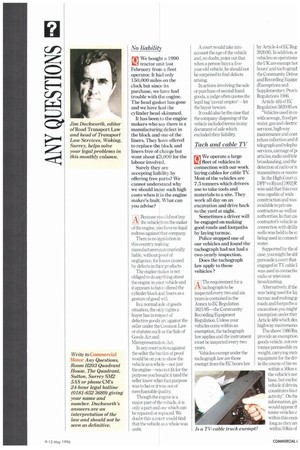No liability
Page 49

If you've noticed an error in this article please click here to report it so we can fix it.
We bought a 1990 tractor unit last February from a fleet operator. It had only 150,000 miles on the clock but since its purchase, we have had trouble with the engine. The head gasket has gone and we have had the cylinder head skimmed.
It has been to the engine makers who say there is a manufacturing defect in the block and one of the liners. They have offered to replace the block and liners free of charge but want about £3,000 for the labour involved.
Surely they are accepting liability by offering free parts? We cannot understand why we should incur such high costs when it is the engine maker's fault. What can you advise?
A Because you did not buy
the vehicle from the maker of the engine, you have no legal redress against that company.
There is no legislation in this country making manufacturers automatically liable, without proof of negligence, for lost:cs caused by defects in their products.
The engine maker is not obliged to do anything about the engine in your vehicle and it appears to have offered the cylinder block and liners as a gesture of good will.
In a normal sale of goods situation, the only rights a buyer has in respect of defective goods are against the seller under the Common Law or statutes such as the Sale of Goods Act and Misrepresentation Act.
In any court action against the seller the burden of proof would be on you to show the vehicle as a whole—not just the engine—was not fit for the purpose you bought it (and the seller knew wtrat that purpose was to be) or it was not of merchantable quality.
Though the engine is a major part of the vehicle, it is only a part and one which can be repaired or replaced. We doubt that a court would find that the vehicle as a whole was unfit. A court would take into account the age of the vehicle and, no doubt, point out that when a person buys a fiveyear-old vehicle, he should not be surprised to find defects arising
In actions involving the sale or purchase of second-hand goods, a judge often quotes the legal tag 'caveat emptor'—let the buyer beware.
It could also be the case that the company disposing of the vehicle included terms in any document of sale which excluded their liability
















































































































